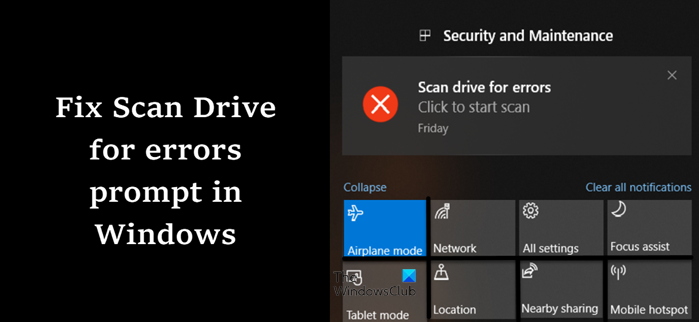Encountering the Scan drive for errors notification on your Windows computer randomly can be a maddening experience. It appears especially when the installation of a program fails due to the Internet disconnection or its partial download. Upon resuming the process, all you notice is the error notification appearing again in the notification area.

Fix Scan drive for errors notification keeps appearing
Scan drive for errors notification is a temporary state that Windows users have to deal with from time to time. Nevertheless, it is easy to fix and you can restore normalcy by following any one of the methods described below.
- Run CHKDSK
- Run a thorough virus scan
- Use alternative disk error checking software
- Run S.M.A.R.T test
- Cancel ChkDsk using Command Prompt.
The error might stop you from using your computer normally because as soon as you see the error message, your computer will restart automatically and when you sign in, the pop-up message from the Action Center will appear again.
1] Run CHKDSK
If some abrupt shutdown earlier, a corrupted software or metadata corruption is resulting in this error, So run the CHKDSK utility.
Open an elevated CMD, type the following and hit Enter to check and repair disk errors on your C drive:
chkdsk c: /r
If asked for a restart. allow it to restart and run chkdsk at boot time.
Read: ChkDsk runs at every startup in Windows
2] Run a thorough virus scan
Windows Defender helps protect your computer against annoying pop-ups, slow performance, and security threats caused by viruses and spyware. So, if you’ve accidentally allowed a virus or malware to get into your system while installing certain applications using a USB flash drive or other removable media, it can result in a Scan drive for errors message. You can use Windows Defender to scan for any infection and to automatically remove (or temporarily quarantine) anything that is detected during a scan. The tool is built-in to Windows and so As such, no installation or subscription is required. You may also use a free 3rd-party portable on-demand antivirus software.
Related: Restart to repair drive errors keep showing up after reboot
3] Use alternative disk error checking software
To rule out the possibility that this error is false-positive, meaning that your drive has no errors to repair, you can use an alternative disk error checking software.
4] Run S.M.A.R.T test
At this point, assuming you have exhausted your options but still faced with the issue, it’s possible you’re dealing with a failing drive.
In this case, you can run the SMART test and see what the result will be before considering replacing the drive and then clean install Windows 11/10.
5] Cancel ChkDsk using Command Prompt
You can cancel the ChkDsk operation using the command-line and see if that helps.
Open a command prompt window, type the following and hit Enter:
fsutil dirty query g:
This command will query the drive, and more than likely it will tell you that it is dirty.
Next, execute the following command:
CHKNTFS /X G:
The X tells Windows to NOT check that particular drive (G) on the next reboot.
At this time, manually reboot your computer, it should not run Chkdsk now, but take you directly to Windows.
Once Windows has fully loaded, bring up another command prompt and execute the following command:
Chkdsk /f /r g:
This should take you through five stages of the scan and will unset that dirty bit. Finally, type the following and hit Enter:
fsutil dirty query g:
Windows will confirm that the dirty bit is not set on that drive.
How many types of drives are there?
There are mainly 2 types of drives: HDD (hard disk drive) and SSD (solid-state drive). HDDs are installed in most PCs and laptops. They contain moving parts as such, they are prone to heating issues and can be damaged. All reading and writing operations are performed due to rotation of the plates and the sensing head located at a few nanometers. Solid-state drives do not contain any moving parts and thus, run cooler and use less energy. Besides, they deliver superior performance and durability.
What is difference between C: drive and D?
C: drive also known as the Local Disk is the most important drive in the computer. It is best utilized as a temporary storage location for files you’re currently working on. Also, any program or application you download and install is stored under this drive by default. (D:) drive on the other hand, is mainly used by many manufacturers to serve as the recovery disks.
How do I know when my hard drive is bad?
The most common signs of a failing hard drive are an overheating computer, strange noises (like clicking or whirring sounds), and data or file corruption. Any Hard drive failure symptoms should not be ignored and investigated thoroughly to save your files and prevent any data from being lost.
Leave a Reply